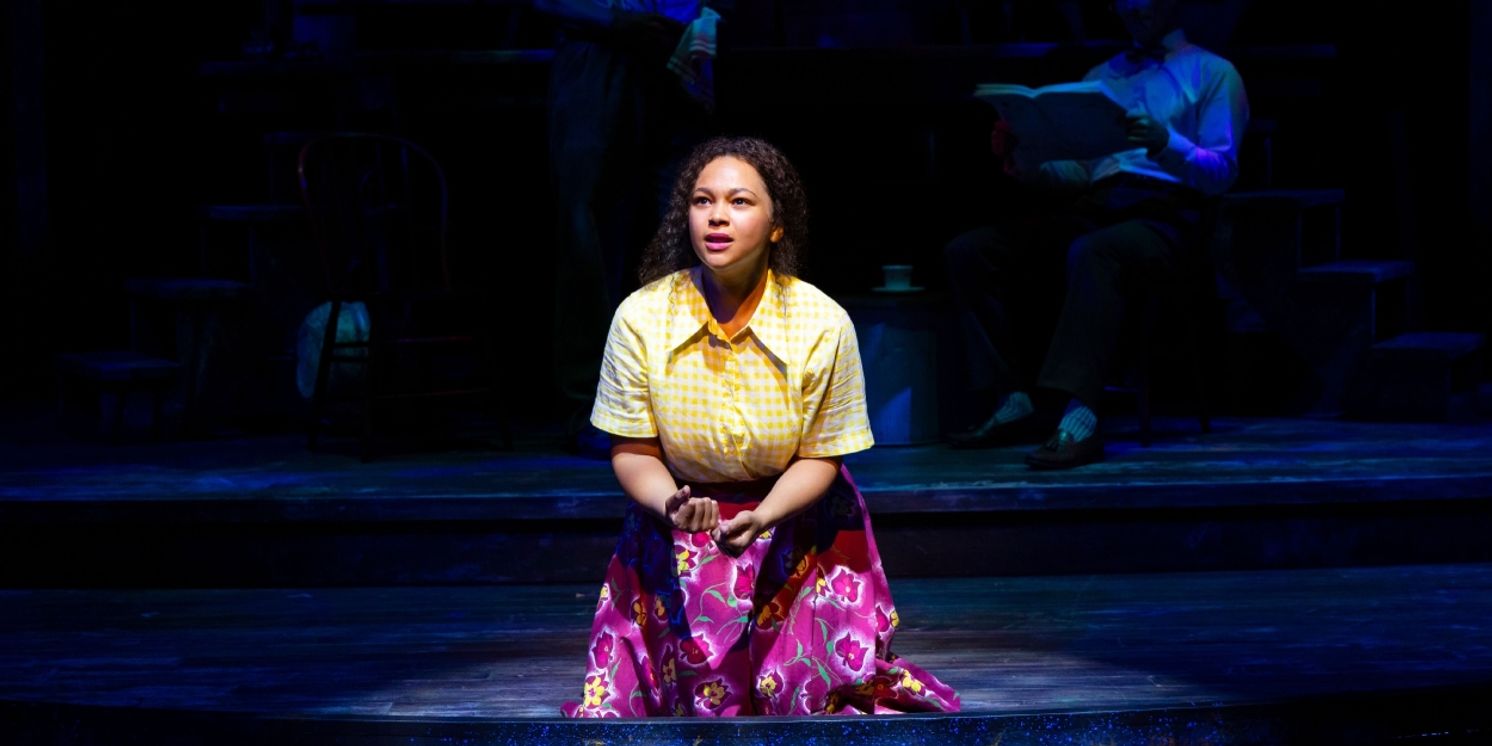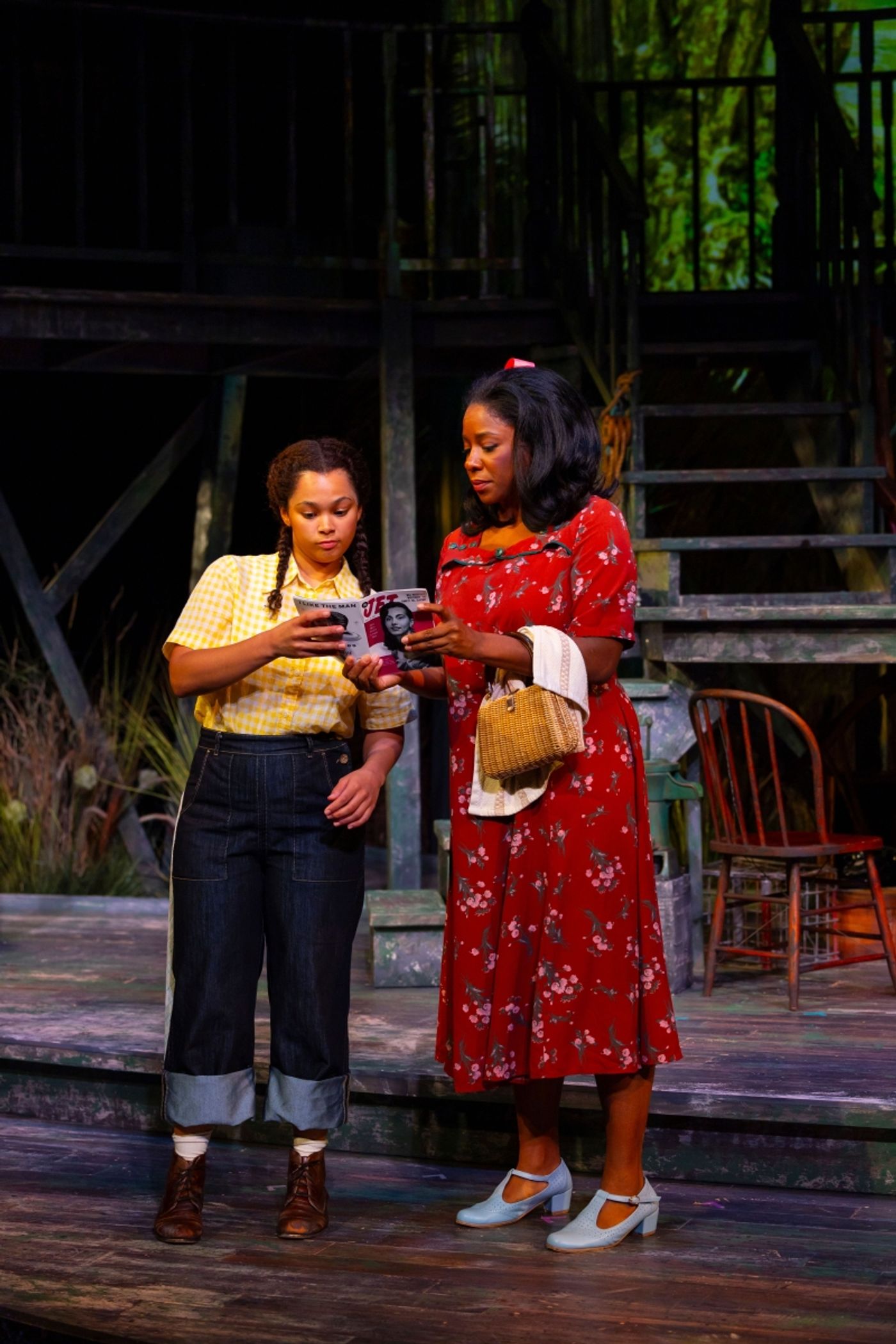Review: BULRUSHER at Berkeley Rep Is a Lyrical Coming-of-Age Tale in a Small Northern California Town
The captivating production of Eisa Davis' 2007 Pulitzer-nominated play runs through December 3rd


Schoolch, and Rob Kellogg as Boy in Eisa Davis’ Bulrusher at Berkeley Rep
It’s always exciting when a play opens up a whole new world to you, even one that exists just beyond your own backyard, and that’s what happens with Berkeley Repertory Theatre’s captivating production of Eisa Davis’ Bulrusher, a 2007 Pulitzer Prize nominee. Davis sets this poetic and mystical play in 1955 in Boonville, a tiny California town north of the Bay Area. I’(M) Willing to bet that many of us have driven through it on the way to the Mendocino coast or to wine tastings in the Anderson Valley without bothering to stop.
Using just six characters, Davis convincingly paints a portrait of an entire community that allows her to explore and explode mid-20th century notions of race, gender and sexuality. It is a multi-layered play that takes its time to reveal itself, but is never less than intriguing and ultimately quite moving. Davis’ language combines the quotidian and the fanciful in a way that recalls great American Playwrights like Tennessee Williams and August Wilson, with a generous dose of novelist Alice Walker.
The dialog is peppered with expressions in Boontling, an actual dialect created by locals partially to allow them to speak in front of people from other towns without them catching onto what is being said. Boontling is both colorful and a bit otherworldly, and a glossary is helpfully included in the program. Hearing it spoken onstage is less confusing that it might sound, and manages to make the characters seen authentic to place and time while elevating everyday speech to a more lyrical realm. It’s easy to see why Davis’ script appealed to the Pulitzer committee.
The story centers on the title character, a multiracial girl who’d been found as an infant floating in a basket on the Navarro River. Bulrusher is now 18 and at a turning point in her life. She has vowed to stop “reading folks’ water” to divine their futures, an unnerving gift that just adds to her feelings of displacement amongst the eccentrics of her predominantly white enclave. When a young Black woman from Birmingham comes to town for reasons that are at first unclear, it sets off a series of events that ultimately lead Bulrusher to discover her own place in the world. Giving away any more of the plot than that would necessitate major spoilers.
Berkeley Rep, in a co-production with Princeton, New Jersey’s McCarter Theatre Center, has given the play an exceptionally handsome mounting. Lawrence E. Moten III’s set is attractive and evocative, mixing the earthbound and the metaphysical, and deftly accommodating a wide variety of tricky locales such an actual river in which the actors can immerse themselves. Valerie St. Pierre Smith’s costumes manage the near-impossible task of being period-specific and attractive while still looking like clothing these smalltown denizens might actually own. Sherrice Mojgani’s shimmery lighting helps delineate atmospheres as disparate as the dark interior of the brothel and the expansive Pacific shore.

an unexpectedly deep connection
with Cyndii Johnson (R) as Vera in
Berkeley Rep's production of Bulrusher
Director Nicole A. Watson has deftly guided her cast toward performances that feel grounded even when speaking challenging language and continually surprise as further layers of their characters are revealed. Jordan Tyson in the title role has the heaviest lifting as she is called upon to conjure the play into being with an incantatory opening monolog that is very difficult to pull off. As her character develops, Tyson never loses sight of the pain and vulnerability that underlie Bulrusher’s prickly exterior. Her performance is beautifully matched by Cyndii Johnson and Rob Kellogg as her two diametrically opposed could-be romantic interests. Johnson overflows with warmth and manifests wonder at her own burgeoning strength as she recovers from a recent violent event. Kellogg manages to imbue a galootishly misguided boy next door with something like an actual soul as he struggles to atone for previous bad behavior now that he finds himself inexorably drawn to Bulrusher.
The two fully adult men in the cast are no less compelling. Jamie LaVerdiere as Schoolch, the teacher who took in Bulrusher as an infant, is mainly a mute observer for the first third of the play, but is always a compelling stage presence. When he finally cuts loose toward the end, LaVerdiere proves he has the emotional goods, not to mention some surprisingly graceful dance moves. Jeorge Bennett Watson as Logger, an itinerant worker and fixture of the brothel has a beguilingly light touch as he oozes understated charm. He’s sweet and funny, and downright sexy in a way that middle-aged men are rarely allowed to be.
Amidst the trove of winning performances, the emotional heart of the piece is provided by Shyla Lefner as Madame, the owner of the brothel where much of the action takes place. Madame is a gimlet-eyed pragmatist avowing that this isn’t going to be her life forever, even as her can-do exterior covers a history of hurt and conflict. Lefner makes all of this completely legible and is utterly enthralling as her emotional journey dovetails beautifully with Bulrusher’s.
This is the kind of play I will likely keep turning turn over in my mind as its characters continue to haunt me. It is also a sterling example of the essential role that regional theaters like Berkeley Rep play in fostering community.
(all photos by T Charles Erickson)
---
Bulrusher runs through Sunday December 3rd at Berkeley Repertory Theatre, 2015 Addison St., Berkeley, CA. Running time is approximately 2 hours 40 minutes, including one intermission. For tickets and additional information, visit www.berkeleyrep.org or call 510-647-2949.
Reader Reviews
Videos

